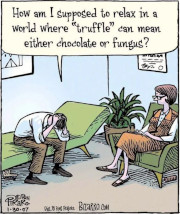|
Home
|
Nov 21, 2022
This week’s themeWhich came first, noun or verb? This week’s words truffle scunner tomcat whinge nitch 
“How am I supposed to relax in a world where truffle can mean either chocolate or fungus?”
Cartoon: Dan Piraro
Previous week’s theme A.Word.A.Day
with Anu GargIf guitar is your thing, you might say: I like playing the guitar. Or you could simply say: I like to guitar. Purists may object, but the verb guitar has been a part of the English language for some 200 years. Yes, first there was the noun guitar (from 1637) and then the verb form (from 1816) arose over time. Noun to verb and vice versa, from one part of speech to another, words evolve. Words change. People change. They don’t have to stay however they were labeled at birth. Why not let them all be? If someone likes to guitar, they don’t stop anyone from playing the guitar. It’s a free world -- do whatever stirs music in your soul. This week we present five more such words that started out as nouns and turned into a verb as well, and vice versa. truffle
PRONUNCIATION:
MEANING:
ETYMOLOGY:
From French truffe, probably from Latin tuber (swelling). The verb intr.
sense alludes to the search for underground truffles, traditionally with
the help of pigs or dogs. The transitive verb is from the stuffing of
truffles in something being cooked. Earliest documented use: noun 1591,
verb 1868.
USAGE:
“I figure there’s no need to mention how Michael is truffling around
trying to find out what Sarah intended to write about.” Jane Pek; The Verifiers; Knopf; 2022. “Bass serves up a rich smorgasbord of a memoir, truffled with pungent anecdotes, sometimes funny, sometimes sorrowful, always savory.” Liesl Schillinger; Travel; New York Times Book Review; Jun 3, 2018. See more usage examples of truffle in Vocabulary.com’s dictionary. A THOUGHT FOR TODAY:
He is a hard man who is only just, and a sad one who is only wise.
-Voltaire, philosopher (21 Nov 1694-1778)
|
|
Subscriber Services
Awards | Stats | Links | Privacy Policy
Contribute | Advertise
Awards | Stats | Links | Privacy Policy
Contribute | Advertise
© 1994-2026 Wordsmith